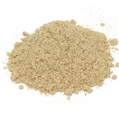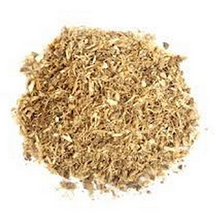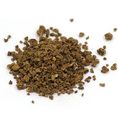 Loading... Please wait...
Loading... Please wait...- Home
- Bulk Herbs
- Herbs (J-L)
- Kudzu Root
Product Description
Kudzu Root
Wild Crafted - China
Also Known As – Pueraria montana var. lobata
Overview - Native to China, when introduced to the southeastern United States, it ran rampant and is considered a noxious invasive weed. The root can grow to be the size of a person and is the source of many Traditional Chinese medicines. The thick stems are hairy with green ovate leaves that grow in threes. The flowers are fragrant purple blossoms that resemble pea flowers. This vine is drought resistant and frost tolerant, and adapts well to any soil. It grows easily and does not require fertilizer, pesticides or regular watering.
Medicinal Uses – Internally, Kuzu is used in Chinese medicine to treat measles, allergies, tonsillitis, infertility, constipation, impotence, dizziness, anemia, internal bleeding, respiratory problems like pneumonia and bronchitis, migraines, aches and pains of the muscles, and fever. Headaches, dizziness and numbness from high blood pressure can also be treated with it. This herb is used for diarrhea, dysentery and for hangovers. There are some studies that suggest it may be helpful in curbing the desire for alcohol. Externally, Kuzu is sometimes used for stiff neck and shoulders.
- It is also used to improve the blood circulation, especially in the capillaries and to the heart. Some studies suggest that this herb may also improve cerebral blood flow in arteriosclerosis patients. Kuzu has been used for Bell's palsy, high blood pressure and angina as well. Other ailments that this remarkable herb has been used for include stiff neck and shoulders, colitis and sudden nerve deafness.
Other Uses – Kuzu can also be used as livestock fodder, as erosion control, to improve soil, to strengthen dams, for mulch and green manure and as food for people. Flour made from the dried root can be used similar to arrowroot as a thickener in soups, stews and sauces. Drinking as herbal tea can strengthen the digestion and increase the vitality. The fibers from the vines can be used for fishing lines, to make paper, baskets and cushion stuffing. It can be used for building material, and as a mosquito repellent when burned.
Herbs to Combine/Supplement - Kuzu is often combined with milk thistle in a formula to curb alcohol use. Combined with umeboshi plum and fresh ginger, kuzu can make an invigorating drink.
Parts Used - The root is used medicinally.
Precautions - With recommended dosages, there have been no reports of side effects or toxicity.
Suggested Preparation and Dosage - The usual dose of kuzu is a 10 mg tablet per day. For extract, this would be the equivalent of 30 to 120 mg taken 2 to 3 times per day.
Disclaimer - The information presented herein by Mountain Maus’ Remedies is intended for educational purposes only. These statements have not been evaluated by the FDA and are not intended to diagnose, cure, treat or prevent disease. Individual results may vary, and before using any supplements, it is always advisable to consult with your own health care provider.
















